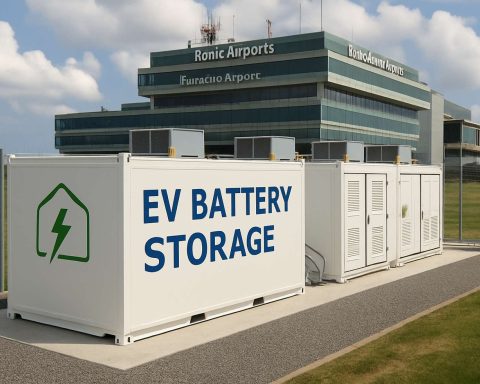- Portsmouth is rapidly expanding its electric vehicle (EV) charging infrastructure, aiming to install up to 320 new chargepoints in addition to upgrading over 80 existing sites.
- EV ownership in the city has surged by nearly 50% in the past year, reflecting growing interest in sustainable transportation.
- A new partnership with operator Zest focuses on improving reliability, accessibility, and user experience across neighborhoods.
- Public consultation is central to the rollout, allowing residents to help decide where new chargepoints will be located.
- The initiative aims to reduce air pollution, support decarbonisation, and move Portsmouth closer to its net-zero goals.
- Residents can track chargepoint availability and updates via the Portsmouth City Council’s online portal.
In the heart of Portsmouth, a quiet revolution is humming to life—poised to reshape the city’s streets and the future of urban travel. Shimmering new electric vehicle (EV) chargepoints have begun to flicker online at dozens of locations, the spark of a sweeping transformation designed to make owning an electric car not just possible, but practical for thousands of residents.
Electric vehicles have been gliding steadily into Portsmouth, with their numbers swelling by nearly 50% in just twelve months. The city’s ambitions now shift into higher gear: a partnership with chargepoint operator Zest has launched, taking on a vast upgrade to existing infrastructure once managed by Joju and Ubitricity. The plan is not just to replace what was there, but to surpass it—bringing over 80 current sites into a new era and rolling out as many as 320 brand new chargepoints across neighbourhoods at record pace.
This initiative is more than a matter of convenience. Each new spark of infrastructure fans the hope of fighting air pollution and traffic emissions, markers of Portsmouth’s commitment to a healthier, cleaner future. Walkers on city streets will soon notice clusters of sleek, modern chargers nestling beside local shops and homes, signaling a tangible shift in the city’s approach to sustainable mobility.
What sets Portsmouth apart in this electric race is the council’s focus on community. Plans are unfolding in phases, and every new batch of proposed charging sites is put before the public for open consultation. Each location undergoes a collective decision-making process, giving residents a real say in how their city adapts. Already, the pulse of public input is shaping which corners are next to receive a charge—a rare melding of grassroots democracy and green policy.
Upgrades go hand in hand with the city’s bold vision to decarbonise transport. By making it easier for drivers to plug in close to home, the council is actively breaking down one of the biggest barriers to EV adoption—lack of reliable, nearby charging. This enhancement isn’t just good for car owners; it’s a leap forward for air quality, for city livability, and for the promise of a net-zero future.
Residents eager to see the latest updates and monitor new locations as they go live can explore the evolving map at Portsmouth City Council. This portal will be a touchstone for those mapping their routes or planning the leap to an electric vehicle.
The key takeaway? Portsmouth is speeding ahead, not just with cables and kilowatts, but with a bold vision for healthier, cleaner living. In the city’s chargepoints, you can see the future coming—and it’s both electrifying and inclusive.
Portsmouth’s Electrifying Leap: The Untold Facts and Future of Citywide EV Charging
—
Portsmouth’s ambitious rollout of electric vehicle (EV) chargepoints marks more than a simple upgrade—it’s a blueprint for modern urban mobility. Here’s a deeper look into the facts, trends, potential challenges, and real-world insights into this citywide transformation, crafted for drivers, homeowners, and green industry watchers alike.
Key Additional Facts
National Context & Market Forecast
– The UK government aims to phase out new petrol and diesel car sales by 2030, creating surging demand for local charging infrastructure ([Gov.uk](https://www.gov.uk)).
– The number of electric cars in the UK exceeded 1.1 million as of early 2024, up from just 90,000 in 2016 (Society of Motor Manufacturers and Traders, SMMT).
– Analysts at BloombergNEF predict that by 2027, EVs will be cheaper to purchase than combustion vehicles in Europe, further driving adoption.
EV Charger Types & Tech Specs
– Most new Portsmouth chargers are likely Level 2, offering 7-22 kW AC charging—ideal for overnight or a few hours’ top-up.
– Rapid chargers (50 kW and above), typically available at strategic points, can deliver up to 80% charge in around 30-40 minutes, critical for commercial users or visitors.
– Zest, the council’s new partner, employs contactless payment and app integration, supporting universal access for all major EV brands and users ([Zest](https://www.zest.uk.com)).
Security & Sustainability
– Modern chargers have built-in data encryption to safeguard user information and payment details.
– Many Portsmouth chargepoints are supplied by 100% renewable electricity sources, further lowering the city’s transport carbon footprint.
– Durable, weather-resistant cabinet designs reduce maintenance needs and ensure long-term public safety.
Community-Driven Model
– Portsmouth’s approach stands out by mandating an open consultation before placing each charger, unlike many UK cities that use a “top-down” model.
– Residents without off-road parking are prioritized—estimated at over 40% of city households, removing a common EV barrier in urban settings (Next Green Car, 2023).
How-To: Using a Portsmouth Chargepoint
1. Locate available chargers via the Portsmouth City Council portal or charging apps like Zap-Map.
2. Park and plug in your vehicle using a compatible Type 2 cable (most common in Europe).
3. Initiate charging using contactless card, app, or RFID tag.
4. Monitor charging status via your car or phone.
5. Unplug and vacate the spot promptly to avoid idle charges or blocking access.
Life Hacks & Real-World Use Cases
– Charging overnight at local hubs can be cheaper than rapid charging at motorway services—plan your route to save.
– Zest’s interoperability means tourists from across the UK can use their usual apps—great for seamless holiday EV travel to coastal Portsmouth.
– Businesses can partner with Zest or the council to request public chargers near high-traffic shops, boosting customer dwell time.
Comparisons & Industry Trends
| Feature | Portsmouth | Southampton | Brighton |
|———————|———————|——————–|——————–|
| Chargepoints (2024) | 400+ planned | 200+ | 350+ |
| Council engagement | Open consultation | Internal plans | Mixed |
| Rapid chargers | Expanding | Moderate | High |
| Community focus | Very high | Moderate | High |
– Rapid expansion in cities like Oxford and London increases competition but also inspires tech upgrades and pricing transparency.
Controversies & Limitations
– On-street chargers, while accessible, sometimes face complaints about pavement clutter or blocked walkways, especially for disabled residents (Transport for All, 2022).
– Network downtime and vandalism remain occasional issues—Zest claims to offer “over 99% uptime,” but user experiences may vary.
– Not all chargers support superfast DC charging, so some vehicles may take longer to top up.
Pricing, Features & Compatibility
– Typical pricing for Portsmouth’s public chargers ranges from £0.35-£0.55 per kWh (market average), subject to future energy costs.
– Zest and other major networks integrate with PlugShare, Zap-Map, and Apple/Google Pay for maximum compatibility.
– Universal compatibility (CCS, CHAdeMO, Type 2) ensures almost any EV can charge, including Teslas, Nissans, BMWs, and VWs.
Insights & Predictions
– Portsmouth’s model of resident consultation is predicted to boost long-term satisfaction and utilization, reducing the risk of “unloved” infrastructure.
– As EV adoption increases, expect bundled offers like free parking for EVs or off-peak charging discounts.
– Smart grid upgrades could allow chargers to interact with home solar systems or grid batteries, enabling community microgrid trials.
Pressing Questions Answered
Q: How does Portsmouth’s EV infrastructure rank in the UK?
A: It leads in resident-focused planning and is on pace, per capita, with the UK’s top 10 cities for charger coverage.
Q: Can electric car owners without home chargers expect reliable access?
A: Yes, with 400+ public chargepoints planned, urban and suburban residents are set to enjoy walkable-range access.
Q: How is the project funded?
A: Funding is a mix of government grants (e.g., Office for Zero Emission Vehicles), council investment, and private sector partners like Zest.
Q: Is it worth switching to an EV in Portsmouth now?
A: With new infrastructure, cleaner air ambitions, and rising gasoline prices, early adoption is increasingly practical and cost-effective.
Quick Tips & Actionable Recommendations
– Use the Portsmouth City Council site to monitor new installations and sign up for updates.
– Consider test-driving an EV during Portsmouth’s Green Week or at local dealerships to gauge charging convenience.
– Download two charging apps (e.g., Zap-Map, PlugShare) for real-time availability and payment options.
– Participate in future public consultations—your feedback can influence where the next chargers are installed!
—
Portsmouth’s electrifying chargepoint transformation is a win for residents, business, and the environment—one thoughtfully placed charger at a time. Now is the perfect moment to discover if electrification fits your lifestyle, commute, and wallet.











